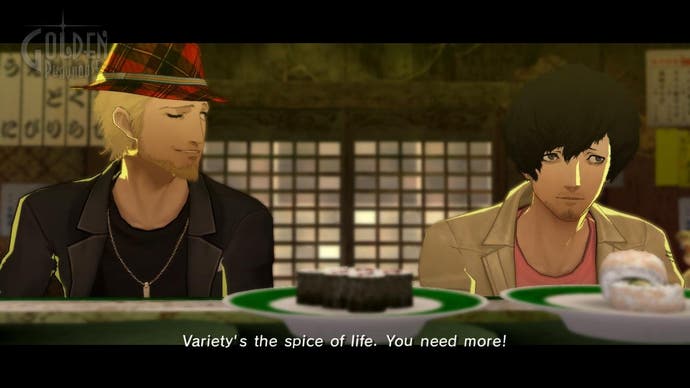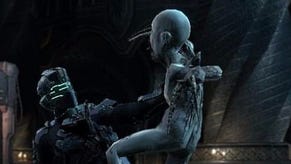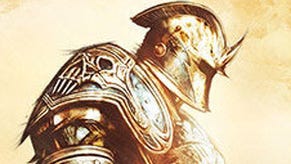Catherine Review
Strange bedfellow.
It's a hallucinatory aesthetic that may sound disjointed when described piece by piece - as any dream does - but coheres in a striking vision of gorgeous dementia. And it's not pure pastiche, either. The nightmare has a logic to it, even if it is an avant-garde logic that makes a game critic sound awfully dumb when he tries to put it into words.
The nightmares are only half of the game (albeit the half where you'll spend the majority of your time.) Much of the material for Vincent's subconscious world comes from the "awake" part of the game, which is far calmer and more dialogue-driven than the dreams.
Each day in Vincent's life presents the player with a couple of cut-scenes before depositing you at the Stray Sheep bar, where Vincent spends every night hunting for respite at the bottom of a sake bottle.
He doesn't find it. The various patrons of the Stray Sheep - most notably his three closest friends - fill his head with more stress and doubt. Some of them muse on the nature of love or on the difference between the sexes. Others offer theories about the peculiar wave of deaths affecting local men who are about Vincent's age. (They're dying in their sleep. Hmm.)
For those who just want to return to the puzzle action of the nightmare world, most of the conversation on offer at the Stray Sheep can be skipped. But these boozy dialogues are an essential part of Catherine's brilliance. They provide little fragments of meaning that are later explored in the dream sequences.
The characters of the Stray Sheep are drawn with care. Their dialogue is crisp but still shaggy enough to feel human. Vincent and his friends are real, grounded beings, with naturalistic voice performances. Troy Baker and Liam O'Brien (the voices of Vincent and best friend Orlando, respectively) give their characters an approachable sound, which is no mean feat.
At the Stray Sheep, Vincent encounters Catherine (with a "C"). She's a blond sylph who develops an instant crush on Vincent. It's hard to imagine how that sullen shmoe could inspire love at first sight, but there we are.
The other side of the equation isn't as hard to figure. When Catherine sits down across from Vincent, he sees a youthful bundle of pure sex - like an overripe peach, just waiting for him to pluck her off the branch and slide his teeth in. She is not unaware of her power over him, nor is she afraid to use it.

So Vincent frets. Does he give himself over to the stability of married life with his overbearing partner Katherine, or does he give himself over to his lust for the coquette who sends naughty pictures to his phone? It feels like he's relenting in either case. These women are happening to him, and Vincent is swept away in their tumult.
To call this situation a love triangle doesn't do it justice, as every day adds another hilarious complication into the mix. So let's say it's a love polygon with a hell of a lot of sides. For his part, Vincent just watches it grow.
Each new twist in Vincent's love life lodges itself in his tortured brain, which sets the stage for the game's most epic moments: the boss battles that conclude each night in the dream world.
Before Vincent can wake up on a given morning, he has to climb a tower while being chased by an enormous manifestation of his worst fears. On the night after Katherine proposes to him, he's hunted by a witch who attempts to pin him down with a dinner fork.
The night that he meets Catherine, he finds himself pursued by the bottom half of a woman's body with a snarling beast's mouth between her legs. It's a great motivator. There's nothing like a razor-toothed crotch-maw to put a spring in your step.

These big showdowns are not just about flashy special effects. This game has style. It does more than wow the player with bombast and wackiness (although it certainly does those things). Catherine also confronts us with a vision of a human psyche in its twisted, baroque glory.
This psyche is a split personality. The daytime Vincent is a pathetic figure. He's paralysed by his inability to make a decision. In the dream world, though, Vincent is practically an iconic figure. Playing as dream-world Vincent, you're hailed as an innovative climber and offer inspiration to your fellow sheep.
Life presents you with a number of crossroads, Catherine suggests, and it's only in choosing a way forward that you gain an identity. In Vincent's case, it's the difference between being a mere protagonist and a hero.
The game will draw attention for its wonderful weirdness, as it should, yet that's only half of the story. Catherine plays its eccentricities against its more down-to-earth side, which makes for a richer comic world than you might get from bizarro fare alone. The upshot is an experience that's both fun and provocative - a nightmare worth staying awake for.






